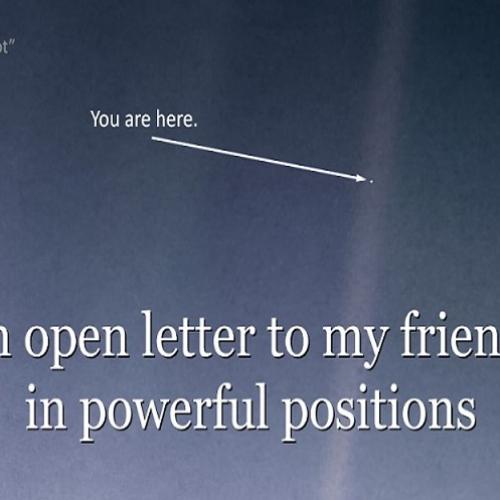
Stanford GSB lecturer and coach Allison Kluger teaches nascent entrepreneurs how to communicate like a leader.
Allison Kluger recalls one of her earliest days as an associate producer at Good Morning America, when a senior producer saw her crying at work.
“She told me, ‘Allison, you can’t cry at the workplace. Do you know why? You’re young, attractive, and female, and nobody will think you’re reliable, and they won’t trust you to do the job. If someone asks, say you’re having a great day, because nobody wants to hear you’re having a bad day.’”
That straight talk taught her something: Kluger needed to act the part of someone who was reliable and capable if she wanted to be perceived that way.
“I became the person who was unflappable,” she says. “I started getting jobs producing live remotes, being on air, and in the control room, and it became authentic. I’m still a very sensitive person and I still cry, but to be the leader I wanted to be, I had to act like the leader I wanted to be.”
This was Kluger’s first lesson in executive presence — or the way people carry themselves, present themselves, communicate with others, and project competence and calm.
This quality inspires others to follow. And it’s something Kluger firmly believes that anyone can learn and develop.
Kluger, the Dorothy J. King Lecturer in Leadership at Stanford Graduate School of Business in the areas of strategic communication, reputation management, and personal branding, spent more than 25 years in broadcast media and entertainment. She hosted and produced at Q2, an offshoot of shopping network QVC, and she was executive producer at the Global Shopping Network. She was an original coordinating producer on ABC’s The View, consulted with Al Gore and Joel Hyatt on the launch of Current TV, and helped MSNBC create a live pilot show for Michael Savage. She also founded her own consultancy in 2005.
She spoke to Insights about executive presence and why it matters.
How Do You Definite Executive Presence?
Executive presence is very much how you control a room, the impressions you make, and how you affect the people around you. It’s how you communicate verbally and through your appearance and physicality. It’s not just appearance, such as how you look, but more how you communicate with people initially and convey your intentions. It’s not “Are you a supermodel?” It’s “Are you dressed appropriately, and do you look put together and powerful, and are you wearing clothes easily and authentically, or do you maybe need to step it up to signify your power and presence?” I liken it to what I say about reputation: If you have great presence, people will feel the remnants and echo of what you left behind when you leave a room — “Wow, I enjoyed what that person had to say, and I will take some action because of it.”
Why Does Developing Good Executive Presence Matter?
Making an impression is not a choice; it’s an inevitability. Whether you know it or not, eyes are going to be on you, and you’re never sure who is viewing you. You can make a great, bad, or neutral impression. Social outings are opportunities to make new connections, and if you don’t make an effort, that’s a lost opportunity. And there’s also an opportunity to make a great first impression, and those people who are conscious of how they initially come off have a leg up on executive presence. In new situations, you can offer to introduce someone to a person they don’t know who can help ease their way; you can make someone feel valued, and that person, in turn, will value you. You will be admired and appreciated, and they will remember that when you leave. Anyone can learn executive presence — it’s really more about being aware.
How Can People Begin to Develop Their Own Executive Presence?
When it comes to executive presence, you want to make people feel like you’ve got their back and you can take care of it, whatever “it” is. It doesn’t mean you have every superpower — some things you’re going to be excellent at, and some you’ll just get through.
For example, I’m not good with numbers. I was at a new job overseeing a department of 70 people, and they called me in and told me everything I would be doing, and then they told me, “You’re going to also have to do the budget.” And I said, “No problem.” But when the meeting was over, I went into the stairwell and started hyperventilating. I thought about all the things I could do specific to my talent, and there I was focusing on the one thing I was going to be uncomfortable with. I was hyperventilating and crying, and I was a wreck.
But then I calmed myself, went to my department assistant and said, “Who is the person who deals with expense reports?” I found that person and asked if she had worked on budgets, and she said yes. I said, “Tomorrow we’re going to set aside three hours to work on the budget,” and she said, “No problem.” All of us feel like imposters at one time or another. None of us wants to feel judged. But having executive presence is about making people feel you can handle things and that you’re smart enough to know your strengths, and for the things you don’t know, you can figure it out or seek help in figuring it out.
Another thing to consider in developing executive presence is communication. Do you look people in the eye? Is there a warmth emanating from you? Are you saying things that will benefit people or inspire them? Or instead, are you looking over their shoulder to see if there’s someone else “better” that you should be talking to?
This also plays into the idea of gravitas. Imagine a swan gliding on the water. When you think of a swan, you think of a creature that’s elegant and composed and flowing smoothly, but under the water there are little webbed feet paddling furiously. When you’re in charge and in control, you’re not letting anyone see those furiously paddling feet. That’s where gravitas comes in. A strong leader has gravitas.
How Does Executive Presence Development Differ for Men and Women?
I tell women and men, “Think about the leader you admire and the leader you want to be, and act like the leader you want to be.” The more you do it, the easier it comes.
“Making an impression is not a choice; it’s an inevitability.”
—Allison Kluger
Women rarely do something unless they feel 100% certain they can, and men only have to feel like they’re 60% certain. But if a woman and a man go and take the same exam, women will do just as well or better. As women, it’s easy to opt out of things that make us nervous, but we should develop a mind-set of, “I’m going to say yes,” and then go freak out in my office or stairwell and figure out how to make it happen. Say yes. Act like the leader you want to be. Whether you are a man or woman, it’s important to know your content, be prepared, and then present it with authority.
The Buzz Phrase of the Moment Recently has Been 'Authentic Selves.' Does the Conflict at all With Executive Presence?
I think authenticity is really important, because people can sniff inauthenticity out quickly. Hopefully, you’re a positive person who wants to do a good job. I truly believe the best combination for success and leadership is warmth and competence, but if you’re all warmth and fuzziness, people don’t always trust that you know what you’re talking about or might perceive that you lack substance. And all competence with no warmth can come off as dry and arrogant. For men and women, combining warmth and competence will lead to great executive presence. People will trust you, like you, and want to follow you.
Four Tips to Developing Your Presence
Allison Kluger says these practices will help you come across as more professional and capable.
- Be aware of your appearance. Are you dressing appropriately for meetings or events when you’re meeting someone who is new? If you are too casual or sloppy, people will ascribe traits to you — they may think you’re lazy or not senior enough to do your job.
- Be aware of how you communicate and how you use your voice. Be clear, present, and strong, and project an action-oriented aura. Rather than saying “I was wondering” or “Perhaps,” say “I believe” and “My plan is this.”
- Be aware of your energy. When you walk into a room, do you stand straight, with good energy, and are you prepared to interact? Make sure you’re aware of people and people are aware of you, because if you’re not (and they’re not), they may come away with a neutral or negative impression. Remember that eye contact, a firm handshake, a smile, and your first and last words are part of the first impression you make.
- Consider your differentiating factor. What is it that makes you special, and how do you broadcast it so people are aware of it? Maybe you’re a great runner or you’re good at coding. Blog about it, or create a seminar to teach others. Being an expert at something teaches you how to embrace the spotlight and broadcast your talents to other people, because sharing with others helps you create a network, take a leadership role, and create new opportunities for yourself.
Find the original Stanford GSB Insights article here.






